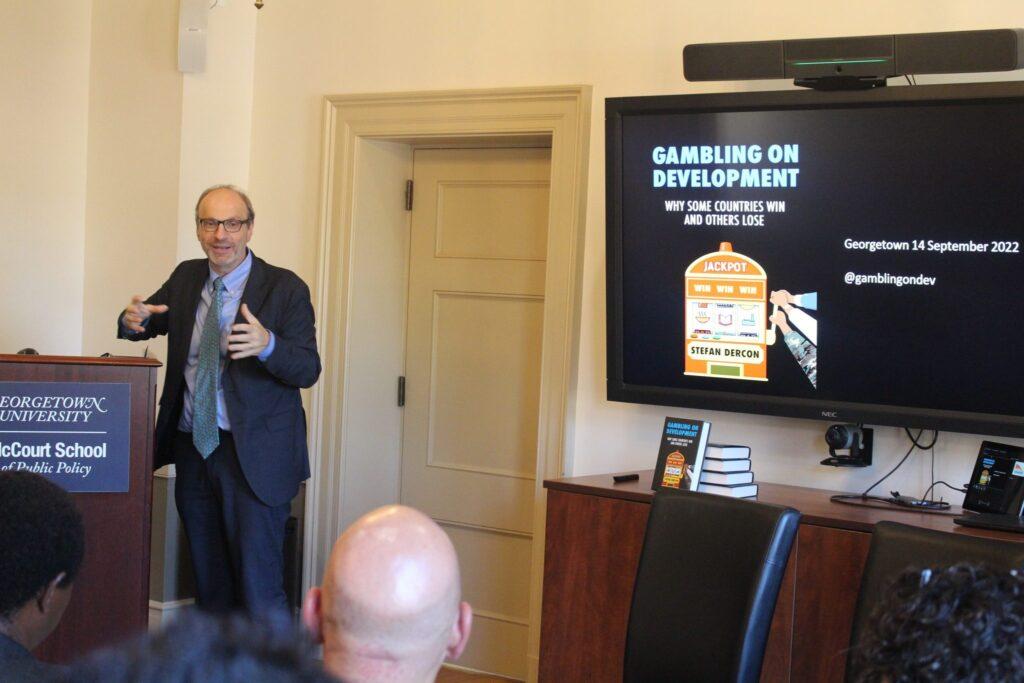The McCourt School of Public Policy hosted a seminar to discuss an Oxford University professor’s book on modern international development theory.
The Sept. 19 seminar featured Director of the Oxford Centre for the Study of African Economies Stefan Dercon’s book entitled “Gambling on Development: Why Some Countries Win and Others Lose.”
This latest work from Dercon, which was published Aug. 1 by Hurst Publishers, an independent non-fiction publisher, explores contemporary factors that contribute to the varying levels of prosperity attained by developing countries. The study is approached from a number of angles, primarily using case studies from African nations including Sierra Leone, Mozambique, South Sudan and Malawi.
Dercon said witnessing the wide disparities that have grown between nations, and in particular those in Africa in the past 30 years, inspired his interest in international development.
“There are places in the last few decades that have transformed, and others haven’t,” Dercon told The Hoya. “Just trying to think about ‘What does it matter why some of these countries are successful or not?’ was just a very compelling reason for me.”
The book features conversations Dercon has had over his three decades of travel through 40 different countries researching global economies.

Specifically, Dercon’s fieldwork in China demonstrates the phenomena that is the focus of his book — where elites within an economy must risk prioritizing broad economic growth and development over other economical concerns on a gamble that doing so will lead to greater long-term benefits.
“The change in China came because the regime suddenly got really committed in the mid-1970’s and early 80’s to growth and development, not ideology,” Dercon said.
Andrew Zeitlin, an assistant professor at the McCourt School and research assistant at the Center, said the key takeaway from the book is that those with political power must take risks to prioritize long-term success in their countries.
“The emergence of a bargain in which the elites of an economy agree that although there are other ways to make your life nice, the way that they want to pursue is a route that operates through the growth of an economy as a whole,” Zeitlin told The Hoya. “That central thesis locates his answer to why some economies grow faster than others in a political bargain, rather than a set of economic policy prescriptions.”
James Habyarimana, professor at the McCourt School and former co-director of Georgetown’s Initiative on Innovation, Development and Evaluation, an initiative working to incubate and evaluate effective development solutions, said this choice is not an easy one to make.
“Where development is going to be much, much harder, the gamble is even less attractive,” Habyarimana said in an interview with The Hoya. “And so the choices these politicians have is, do you want to solve a really, really hard problem, with a high chance of failing, or do you, essentially, want to play the game as usual?”
Habyarimana said this decision relates to his work in international development on a more local scale.
“I work at the level of schools and health facilities, so in some ways this bigger-picture idea of producing economic growth is not immediately salient in my work,” Habyarimana said. “I am very familiar with the choices and decisions made by different governments, where in my work, in some ways, makes me think about a very similar kind of bargain happening at the level of education or health.”
According to Dercon, existing literature on international development can often patronize the people living in the countries being studied, which was something he actively tried to avoid.
“What I was really pleased with is the reaction I’ve had in the countries about which I wrote, from Nigeria, from Bangladesh,” Dercon said. “I don’t feel like people feel patronized.”
Dercon also said the book is not just for academics, but anyone curious about the field of international development.
“If you work as a practitioner or are an interested party, could you read it? That was definitely my goal,” Dercon said. “This is not a popular book, but it’s a book that is aimed at those people who are interested in it and want to learn more.”





















